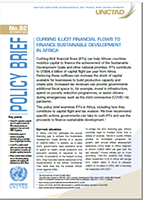
Curbing illicit financial flows (IFFs) can help African countries mobilize capital to finance the achievement of the Sustainable Development Goals and other national priorities. IFFs contribute to $88.6 billion of capital flight per year from then continent.
Reducing these outflows can increase the stock of capital available for businesses to build productive capacity and create jobs. Increased tax revenues can provide governments additional fiscal space to, for example, invest in infrastructure, spend on poverty reduction programmes, or assist citizens during emergencies, such as the 2020 coronavirus (COVID-19) pandemic.
This policy brief examines IFFs in Africa, including how they contribute to capital flight and tax evasion. It then recommends specific actions governments can take to curb IFFs and use the proceeds to finance sustainable development.
Key points:
-
Curbing IFFs represents a potential source of capital to invest in the SDGs, national priorities and responses to crises such as the COVID-19 pandemic.
-
Under invoicing exports of extractive commodities, particularly gold, is an important source of capital flight from Africa. To curb IFFs, countries should collect more and better trade data, close loopholes in tax treaties and strengthen regulatory frameworks.
-
African countries should coordinate more on data sharing, aligning regulations and engaging with international tax reform efforts.




